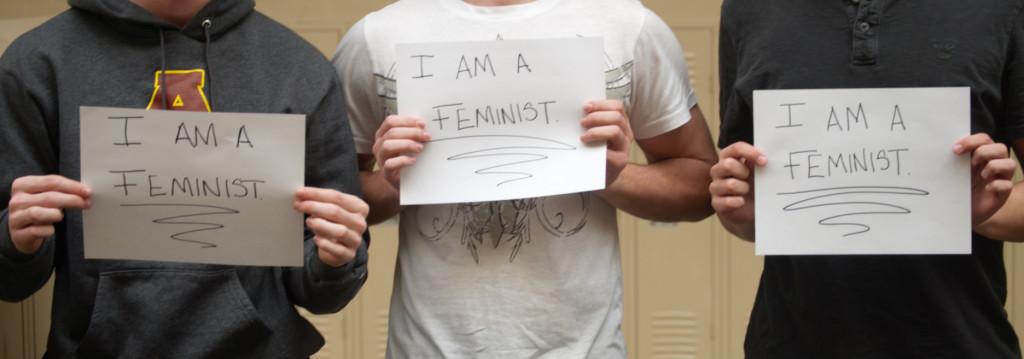The Real Mission of a Feminist
Male Adams students hold signs in support of feminism.
This year marks the 40th year since the United Nations honored the idea of International Women’s Day in 1975. It is 2014, and women still are unable to acquire certain rights that men have always been entitled to.
What’s a feminist?
Women are constantly viewed in negative lights and are categorized between women who are sexually liberated and women who are conservative in that aspect. The campaign for women’s rights, however, has gone on for over 200 years in the United States, and many remain unaware of what most women strive for; equality and understanding.
The word “feminist” has a severe negative connotation. One cannot blame others for this when there are extremists who imperialize only the idea of defeating and conquering the other sex. Let it be known that these are not the views of a feminist.
Extremists give every religion and civil rights freedom movement negative connotations. Clearly, the Westboro Baptist Church is not an accurate representation of the fundamental principles of Christianity. Islamic extremists who murder innocent civilians for no sensible reason do not represent the nature or beliefs of all people of the Muslim faith, just as Kim Kardashian does not represent the lifestyle, work ethic and morality of every American. There is no correlation.
The mission of real feminists and women’s rights movements are to educate others and destroy barriers that society has made for them. Although the campaign for women’s rights has gone on for over 200 years, it became evident in 1908 when women began to finally realize how insignificant they had been treated. On March 8, 1908, 15,000 women marched through New York City demanding shorter hours, better pay and voting rights; hence, the annual date of International Women’s Day was established.
In the workforce
Too many remain unaware of the injustices being done to women. According to whitehouse.gov, on average, full-time working women earn just 77 cents for every dollar a man earns. It’s comforting to know that women are only considered to be 77% of a human being. Naturally, AHS females expresses some strong opinions about this topic.
“As the daughter of a single mother, I witness on a daily basis that women still struggle against discrimination and gender stereotyping– both socially and economically,” said senior Lauren Courtney. “It’s difficult because female objectification and discrimination has become so deeply ingrained in our social customs and practices. The more you start paying attention to differences between the treatment of men and women– especially in the media, the more appalled you will become.”
Are women given the same advantages men are given? Institutionally, the answer is yes. Women do have the opportunity to go to college, receive an education, get a job, receive a promotion, etc., but there is a clear disconnect between society and this realization. Where does the fault lie? Both men and women are guilty of ingraining those beliefs of female inferiority and male superiority. It’s a societal issue.
“Tradition is really the main reason for women not being able to move past societal norms,” said senior Helaman Sanchez.
From an employer standpoint, if a man and woman apply for the same job with the same qualifications, it is often the consensus that the man receive the job, despite affirmative action. Why does the man receives the job? In this circumstance, the employer may take into consideration that both, the man and woman, have families. Many have the mindset that women with children are more difficult and inconvenient than a man with children. What sense does that make? They both have children. They both must take care of the child when he/she is ill. Why has society not adapted to the idea that women are made for more than their traditional domestic duties?
Pop Culture
While growing up, many young girls are inspired to a pre-cured image that was created for women, through media, entertainment and common societal customs. Television often generalizes women as only aspiring to find the dream wedding dress and popular movies such as “Grease” and “The Little Mermaid” only teach young girls to change themselves for the opportunity of finding a man.
“Although in history it’s been said that women often aspire to raise a family, I believe that women should pursue a career or aspire to something more, if they wish to,” said senior Clayton Yocca. “I believe they should have a common goal to be as successful as men have been, if they wish to. If a woman aspires to raise a family, then that’s their preference. The same goes for men.”
Music made popular by outrageous lyrics and shenanigans has squandered the image of women in today’s society. Songs, such as the infamous “blurred lines” by Robin Thicke has made out to be a hit, but also ridiculed and, in some cases, banned by other countries for their horrific lyrics and threats against women! Yet the US has failed to acknowledge the horror and the stimulation that music and pop-culture have created.
“It’s absolutely disgusting. It encourages date-rape!” said junior Sheham Saif. “I was not immediately aware of the songs meaning, just the catchy tune. Once it was brought to my attention, I was horrified.”
Women in the Government
According to the National Conference of State Legislatures, women do not even comprise 44% of one single state’s legislature. In fact, four states have legislature comprised of 5-14 percent of women. However, 56 percent of Rwanda’s legislative body is comprised of females. What century is this?
“I would never have guessed that we’d have a black president before a woman president,” said senior Brandon Santana. “Especially since civil rights for African-Americans happened after women were allowed their rights. It’s interesting that other countries have more women in power than the United States does. I mean, Iraq has more women on their legislature than the US! That’s crazy.”
Rape and Shame Culture
Often times, women are also criticized for being sexually liberated. There is a severe issue with the current generation and “slut shaming.” Social media has increased the severity of the issue by creating infamous sites, such as Formspring, ask.fm, etc., where a person may anonymously give their unjustified opinion about a person, whom they may or may not know well.. The hypocrisy of the statement is the idea that both men and women must engage in the activity, so why are women criticized while men are high-fived and pat on the back?
“You don’t know what is going on in someone’s life and decisions they make can be irrational but justified for the situation at hand,” said senior Daniel Carniak.
More recent issues have arisen where women are told that they are responsible for actions made by others. According to a recent study, one in ten people agree that “dancing provocatively, flirting or wearing revealing clothing” makes them responsible for any assault or rape made against them. This culture of blame deters victims from reporting the crime, according to the sexual assault clinics that carried out the poll. Let it be known, that it does not matter how sexually liberated one may or may not be, no one ever deserves to be raped or assaulted.
“The assumption that women’s clothing suggests that they are asking to be assaulted is out-right wrong,” said senior Maddi Adams. “Women wear clothing for themselves. They don’t wear clothing for others. The insinuation that women are speaking through their clothing doesn’t even make sense. Some people need to get over it.”
Radical feminist movements attempt to debunk these ideas that the victim is at fault. Pictures of victims who are provocatively dressed next to victims who are covered head to toe, circulate the internet, in order to prove that it does not matter what a woman presents herself as; predators will always prey.
For over 200 years, women have strived for equality. Why does society have a right to take away women’s civil rights? Women are human beings. Women are more than 77 percent of a person; they are an entire person. Equal rights for equal work. That makes sense, right? The mission of a feminist is not as radical as to say that women are better than men, but women and men are equal.






